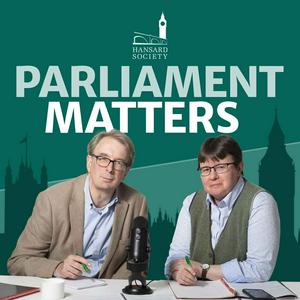134 épisodes
- What happens when you lose the party whip? A conversation with Neil Duncan-Jordan MP
Labour MP Neil Duncan-Jordan joins us this week to reflect on his experience as one of the new intake’s most prominent rebels. He describes defying the whip over the means-testing of the Winter Fuel Allowance and proposed disability benefit cuts, the fallout from his suspension from the Parliamentary Labour Party, and the personal and political pressures that come with rebellion. He also discusses his relationship with the Whips and explains why he has twice called for Sir Keir Starmer to step down, most recently in the wake of the Mandelson affair.
In this week’s episode, we also assess Starmer’s increasingly fragile position following the Mandelson–Epstein controversy, examining the risk of further damaging disclosures about Mandelson’s contact with Ministers and the potential implications for the Government’s legislative programme. We untangle the constitutional confusion surrounding proposals to strip Peter Mandelson and other disgraced peers of their titles, exploring weaknesses in the House of Lords’ Code of Conduct, and the broader dangers of legislating in response to a single scandal.
Gordon Brown has called for sweeping “root and branch” standards reform – from a new anti-corruption commission to greater use of citizens’ juries on parliamentary standards and enhanced select committee scrutiny of ministerial and other public appointments. Ruth and Mark question whether such changes would genuinely rebuild public trust, pointing to nearly two decades of Hansard Society polling showing consistently low levels of trust in politicians and in the effectiveness of the political system. They also argue that the current focus on expelling disgraced Peers from the House of Lords misses a fundamental issue: the Prime Minister’s largely unchecked power to appoint them in the first place.
We return to the slow progress of the assisted dying bill in the House of Lords, where disagreement continues over whether the pace of debate reflects legitimate scrutiny or amounts to filibustering. Some MPs are calling for accelerated Lords reform in response – but would a wholly elected second chamber be more likely to block legislation rather than less?
Finally, we discuss two significant reports from the Procedure Committee: one recommending against the introduction of call lists for debates in the Commons Chamber, and another proposing changes to the way select committee chairs and deputy speakers are elected in the House of Commons.
🎓 Learn more using our resources for the issues mentioned in this episode.
❓ Send us your questions about Parliament:
✅ Subscribe to our newsletter.
📱 Follow us across social media @HansardSociety / @hansardsociety.bsky.social
£ - Support the Hansard Society and this podcast by making a donation today.
Parliament Matters is a Hansard Society production supported by the Joseph Rowntree Charitable Trust.
Presenters: Mark D’Arcy and Ruth Fox
Producer: Richard Townsend
Hosted on Acast. See acast.com/privacy for more information. - It has been a bruising week for the Prime Minister after the House of Commons backed a Conservative “Humble Address” demanding documents on Sir Keir Starmer’s vetting of Lord Mandelson for the Washington Ambassadorship. We explain how the procedure works, what role the Intelligence and Security Committee may play in decisions on disclosure, and how legislation to strip a peerage could be introduced. Plus, the latest on the Restoration and Renewal of Parliament as yet another report lands with a new set of costings.
______
🎓 Learn more using our resources for the issues mentioned in this episode.
❓ Send us your questions about Parliament:
✅ Subscribe to our newsletter.
📱 Follow us across social media @HansardSociety / @hansardsociety.bsky.social
£ - Support the Hansard Society and this podcast by making a donation today.
Parliament Matters is a Hansard Society production supported by the Joseph Rowntree Charitable Trust.
Presenters: Mark D’Arcy and Ruth Fox
Producer: Richard Townsend
Hosted on Acast. See acast.com/privacy for more information. - This week we explore one of Westminster’s strangest constitutional hangovers: why MPs can’t simply resign. With the Gorton and Denton by-election triggered by Andrew Gwynne’s departure, listeners asked the obvious question – why the medieval-sounding detour via the Chiltern Hundreds (or its less glamorous cousin, the Manor of Northstead)? We trace the rule back to 1623, when the Commons barred resignations, and to later fears about MPs being bought off by “offices of profit” from the Crown. The workaround – appointing an MP to a Crown office that disqualifies them – still survives, complete with modern legal “fudges”. Along the way, we revisit colourful resignations and near-resignations, from mass Ulster Unionist walkouts to John Stonehouse’s attempted disappearance and Gerry Adams’s objection to being handed a Crown role he didn’t want.
In this episode we also check the Government’s legislative scorecard as the Session edges toward its expected May close, with several dozen bills already on the statute book and many more still in play. We explain “carry-over” motions – how some bills can leap across prorogation – and why the Government has produced surprisingly few bills for pre-legislative scrutiny compared with the first Session in recent previous parliaments.
Finally, the focus shifts to the Armed Forces Bill, the five-yearly legislation rooted in the Bill of Rights that renews the legal basis for military discipline and Parliament’s consent for a standing army. Labour MP Jayne Kirkham joins us to discuss how her Ten Minute Rule proposal secured Royal Fleet Auxiliary access to the new Armed Forces Commissioner, and what it’s like learning the ropes on bill committees as a new MP.
_____
🎓 Learn more using our resources for the issues mentioned in this episode.
❓ Send us your questions about Parliament:
✅ Subscribe to our newsletter.
📱 Follow us across social media @HansardSociety / @hansardsociety.bsky.social
£ - Support the Hansard Society and this podcast by making a donation today.
Parliament Matters is a Hansard Society production supported by the Joseph Rowntree Charitable Trust.
Presenters: Mark D’Arcy and Ruth Fox
Producer: Richard Townsend
Hosted on Acast. See acast.com/privacy for more information. - The assisted dying bill – properly known as the Terminally Ill Adults (End of Life) Bill – is facing an extraordinary procedural logjam in the House of Lords. More than 1,170 amendments remain to be debated, organised into 89 groups for debate, yet only 20 of those groups have been reached after seven days in Committee. With just a handful of sitting Fridays left before the end of the Session, Lord Falconer has warned that the Bill is very unlikely to complete its Lords stages in time. In a letter to Peers, he has floated a list of possible compromise amendments but has also, for the first time, strongly indicated that the Parliament Act may need to be invoked to override the opposition of a small group of Peers and secure the Bill’s passage in the next Session.
Although rarely used, and never in relation to a Private Members Bill, the Parliament Act has been deployed before on highly contentious measures, most recently the Hunting Bill in 2004. Using it to force through the assisted dying bill would require intricate choreography in both the Commons and the Lords, as well as major political decisions about whether the government formally takes ownership of the Bill or whether it continues as a Private Member’s Bill. It would also raise difficult questions about how amendments are handled, and how far MPs and ministers are prepared to go to assert the primacy of the elected House in the face of sustained resistance from a small but determined group of Peers.
In this episode, we explore how the Parliament Act works, how it could be used in this case, and the political and constitutional trade-offs involved in relying on it to deliver this legislation.
____
🎓 Learn more using our resources for the issues mentioned in this episode.
❓ Send us your questions about Parliament:
✅ Subscribe to our newsletter.
📱 Follow us across social media @HansardSociety / @hansardsociety.bsky.social
£ - Support the Hansard Society and this podcast by making a donation today.
Parliament Matters is a Hansard Society production supported by the Joseph Rowntree Charitable Trust.
Presenters: Mark D’Arcy and Ruth Fox
Producer: Richard Townsend
Hosted on Acast. See acast.com/privacy for more information. - In this episode, we ask whether MPs who switch parties should be forced to face a by-election – and what this month’s spate of defections says about representation, party power and voter consent. We also unpick a dizzying week in British and global politics as “hurricane Trump” batters the post-war order, testing the UK-US alliance and raising awkward questions about NATO, defence spending and procurement. Plus: the Lords’ push for an under-16s social media ban, Chagos ping-pong, and why is the bill to remove hereditary Peers from the House of Lords stalled?
____
With Westminster watching Washington’s every swerve, we explore why Keir Starmer’s most outspoken pushback on tariffs and Greenland matters – and why making big foreign-policy statements outside the Commons still rankles.
In the Lords, a proposed ban on social media for under-16s forces the government into damage-limitation. Is the government’s promised consultation a serious route to action, or simply a way of kicking a difficult issue into the long grass? We look at how enforceable such a ban would be, how it fits with the existing Online Safety Act, and the political and constitutional tension of tightening access at 16 while simultaneously debating votes at 16.
We then turn to a growing list of legislative headaches: the Hillsborough Law stalling again amid disputes over national security carve-outs; renewed procedural drama over the Chagos Islands Bill, how the financial privilege of the House of Commons blocks Lords amendments, and what options Peers have left. We also ask why the bill to remove he remaining hereditary peers appears to be stuck in a curious parliamentary holding pattern.
Finally, we focus on party switching, the e-petition calling for automatic by-elections for defecting MPs, and whether such a rule would enhance democratic accountability or simply hand party machines a powerful new weapon against dissent. As we were recording, news broke of an actual by-election, with Andrew Gwynne MP announcing his resignation on health grounds – a vacancy that could trigger a contest with significant implications for Labour’s internal politics and Sir Keir Starmer’s leadership.
____
🎓 Learn more using our resources for the issues mentioned in this episode.
❓ Send us your questions about Parliament:
✅ Subscribe to our newsletter.
📱 Follow us across social media @HansardSociety / @hansardsociety.bsky.social
£ - Support the Hansard Society and this podcast by making a donation today.
Parliament Matters is a Hansard Society production supported by the Joseph Rowntree Charitable Trust.
Presenters: Mark D’Arcy and Ruth Fox
Producer: Richard Townsend
Hosted on Acast. See acast.com/privacy for more information.
Plus de podcasts Gouvernement
Podcasts tendance de Gouvernement
À propos de Parliament Matters
Join two of the UK's leading parliamentary experts, Mark D'Arcy and Ruth Fox, as they guide you through the often mysterious ways our politicians do business and explore the running controversies about the way Parliament works. Each week they will analyse how laws are made and ministers held accountable by the people we send to Westminster. They will be debating the topical issues of the day, looking back at key historical events and discussing the latest research on democracy and Parliament. Why? Because whether it's the taxes you pay, or the laws you've got to obey... Parliament matters!Mark D'Arcy was the BBC's parliamentary correspondent for two decades. Ruth Fox is the Director of the parliamentary think-tank the Hansard Society.❓ Submit your questions on all things Parliament to Mark and Ruth via our website here: hansardsociety.org.uk/pm#qs📱 Follow us across social media @HansardSociety and...✅ Subscribe to our newsletter for all the latest updates related to the Parliament Matters podcast and the wider work of the Hansard Society: hansardsociety.org.uk/nl.Parliament Matters is a Hansard Society production supported by the Joseph Rowntree Charitable Trust • Founding producer Luke Boga Mitchell; episode producer Richard Townsend. Hosted on Acast. See acast.com/privacy for more information.
Site web du podcastÉcoutez Parliament Matters, L'ordre du monde ou d'autres podcasts du monde entier - avec l'app de radio.fr

Obtenez l’app radio.fr gratuite
- Ajout de radios et podcasts en favoris
- Diffusion via Wi-Fi ou Bluetooth
- Carplay & Android Auto compatibles
- Et encore plus de fonctionnalités
Obtenez l’app radio.fr gratuite
- Ajout de radios et podcasts en favoris
- Diffusion via Wi-Fi ou Bluetooth
- Carplay & Android Auto compatibles
- Et encore plus de fonctionnalités


Parliament Matters
Scannez le code,
Téléchargez l’app,
Écoutez.
Téléchargez l’app,
Écoutez.





































